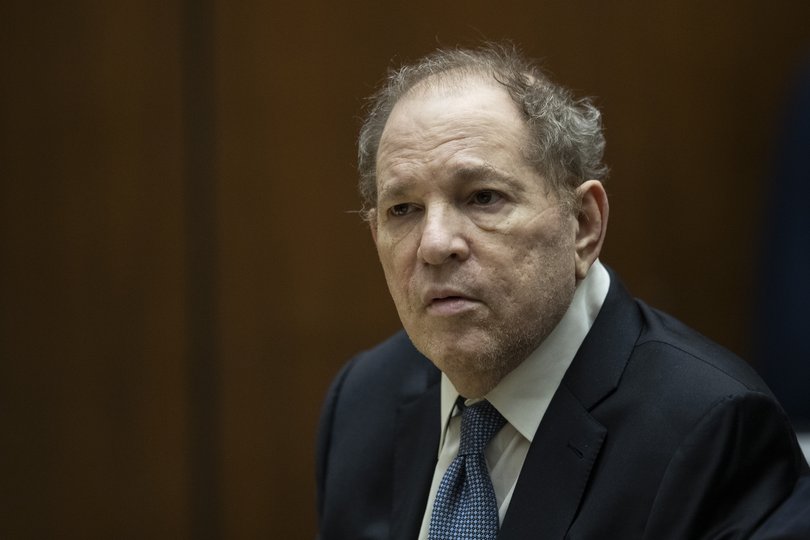Andy Bryon: No escaping the morality police in the internet age of vicious voyeurism
In the internet age, the cameras are always rolling, and people’s worst moments draw millions of eyeballs as online audiences flock to weigh in.

Gone are the days when you could have an affair or yell at a flight attendant or bully your neighbours in peace.
In the internet age, the cameras are always rolling, and people’s worst moments draw millions of eyeballs as online audiences flock to weigh in.
Such is the case for Andy Byron, CEO of tech company Astronomer, who on Wednesday night was filmed cuddling with his human resources chief at a Coldplay concert in Boston.
Sign up to The Nightly's newsletters.
Get the first look at the digital newspaper, curated daily stories and breaking headlines delivered to your inbox.
By continuing you agree to our Terms and Privacy Policy.Mr Byron and his co-worker appeared on the arena video board in a “kiss cam” segment before looking uncomfortable and ducking out of sight as Coldplay front man Chris Martin quipped that the two might be having an affair.
Another concert attendee posted the clip to TikTok, where it’s drawn more than 62 million views and thousands of comments attacking Mr Byron, who appears to be married.
Commenters quickly identified both Mr Byron and his co-worker Kristin Cabot, with many also naming Mr Byron’s family members and sharing details from a personal Facebook page.

“This is an example of God looking out for the people (Mr Byron and Ms Cabot) are betraying,” said one comment with 100,000 likes.
Attempts to reach Mr Byron and Ms Cabot on Friday were unsuccessful. Both appear to have deactivated their LinkedIn pages.
“Astronomer is committed to the values and culture that have guided us since our founding. Our leaders are expected to set the standard in both conduct and accountability,” the company said in a post on X, adding that its board will investigate the clip.
It’s the latest in a stream of viral moments centred around a regular person’s perceived moral failings.
From “West Elm Caleb”, a man in New York City who blew up online after dating multiple women at once, to “JetBlue Karen”, a woman who tried to cut in line on a crowded passenger fligh, online audiences are presented with an ever-rotating cast of characters to adjudicate and (usually) despise.
Public castigation isn’t new, but the internet now turns everyday transgressions into entertainment fodder for millions, some cultural critics say.
It raises new risks and ethical questions, especially since the online attention machine doesn’t always differentiate between serious abuses and smaller interpersonal conflicts, they say.
People online have flooded en masse to the comment sections of alleged cheaters, rude customers and even poor party hosts, at times harassing the assumed-guilty parties by contacting their employers and families.
When a Texas mother felt snubbed after attending a neighbourhood party where other attendees didn’t appreciate her antipasto salad, users quickly found the host, who later uploaded and then deleted an apology video.
The automated search suggestion on the original video contains the first and last names of the party host and her husband.
At the same time, the prevalence of doorbell cameras, video boards and retail and government surveillance systems create more ways for people to be filmed.
With the massive growth of video devices in all environments, “this particular incident will certainly create new awareness for people in public spaces,” Elizabeth Parks, president and chief marketing officer for Parks Associates, a consumer technology market-research firm, said.
Public shaming campaigns — like the one directed at Mr Byron — share some qualities with cancel culture, a term usually invoked when a well-known figure gets publicly criticised for offenses that in the past went unpunished, like workplace harassment or offensive language.
Unlike the condemnation directed at Harvey Weinstein for preying on young actresses or US celebrity chef Paula Deen for using a racial slur, however, Mr Byron is a private citizen without a public persona.

As of Saturday morning, “CEO caught cheating” was the third top-trending Google search across the U.S.
For many internet onlookers, the case is already closed, and some went so far as to contact Mr Byron’s wife and children, according to comments on TikTok.
It reveals an audience desperate for its next hit of adrenaline and unconcerned with the effect its attention may have on the real-life characters involved, says internet culture critic Rayne Fisher-Quann, who writes a popular Substack newsletter.
Infidelity, public meltdowns and bad parenting are all ripe for viral moments because viewers feel they’re peeking behind the scenes of another person’s private life and helping enact the punishment they (ostensibly) deserve, Ms Fisher-Quann said.
When she first wrote about the online “panopticon” — wherein social-media users monitor for bad behaviour and indiscriminately share footage of people who didn’t agree to be filmed — audiences were still discussing whether it’s right or wrong to meddle in a stranger’s life on such a large stage, she said.
Now digital surveillance from corporations and the US Federal Government has normalised constant monitoring, and interpersonal surveillance is a natural outcome, she said.
At the same time, algorithmic apps have accustomed us to a steady stream of highly stimulating content, she said.
A public gaffe or betrayal provides a perfect opportunity for audiences to get their fix, Ms Fisher-Quann said, as they rush to get involved in the story, like an “interactive, choose-your-own-adventure, detective-style game”.
The impact of public shaming on its subjects has already been studied.
As early as 2015, writers such as Jon Ronson were documenting what happens to regular people when they find themselves on the wrong side of an online mob.
Many lost their jobs and experienced lasting mental health problems, according to Ronson’s best-selling book So You’ve Been Publicly Shamed.
Some scholars, meanwhile, argue that public shaming can serve both good and bad functions, depending on the offense and the scale of the backlash.
The phenomenon also affects participants, experts say. Therapists who work with Gen Z say their clients increasingly use digital tools to monitor their romantic partner’s every online interaction, creating a pattern of mistrust and paranoia.
Stories of parents, friends and partners misusing location-sharing features, meanwhile, highlight how interpersonal surveillance can injure relationships.
No one knows how this story will end for Mr Byron, Ms Cabot and their families. By the time the dust settles, the internet will have fixed its gaze on a new villain — or at least someone who had the bad luck to mess up in public.
-The Washington Post
